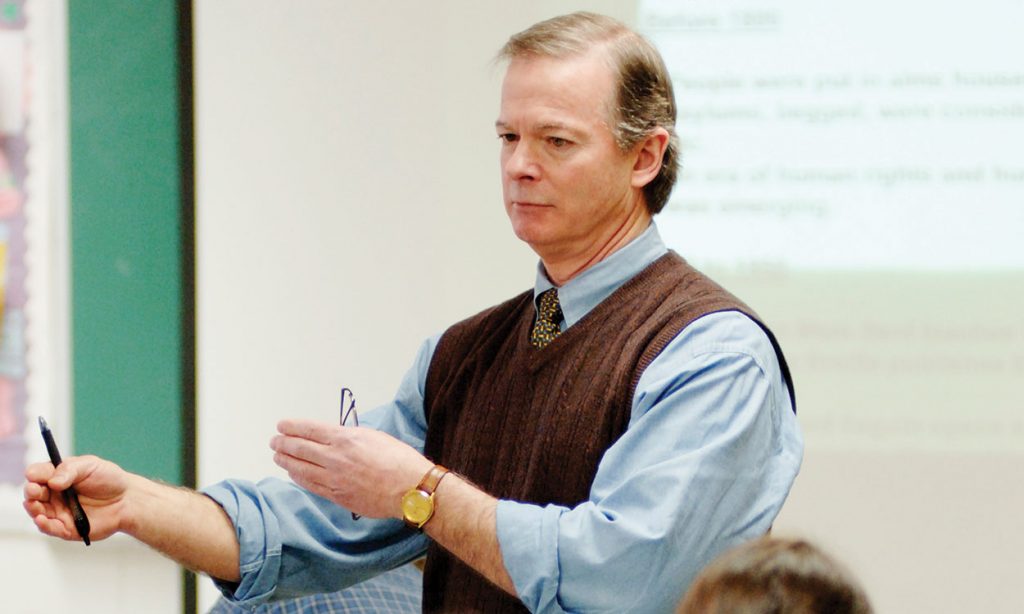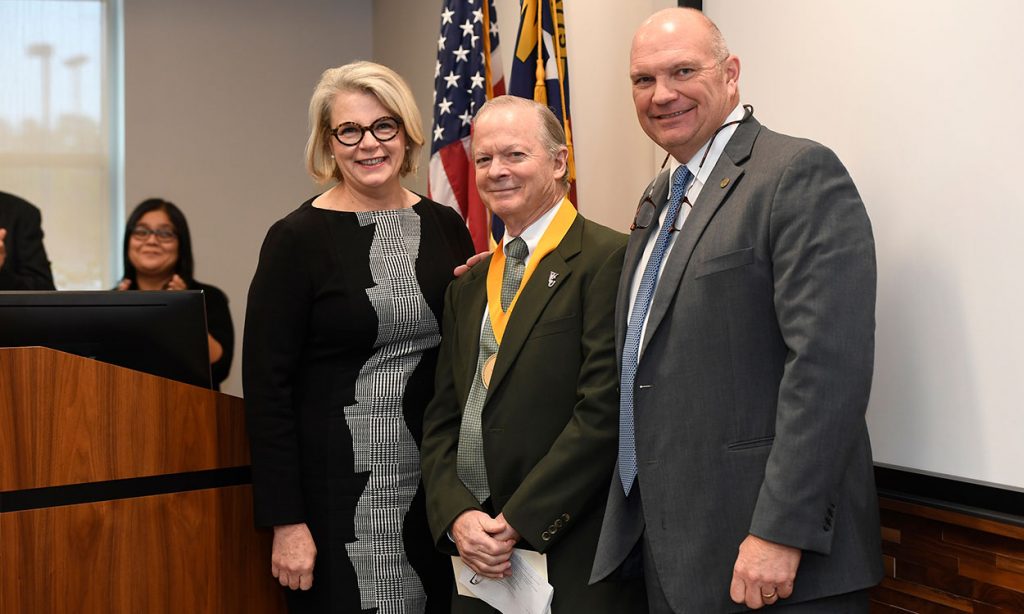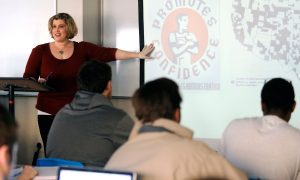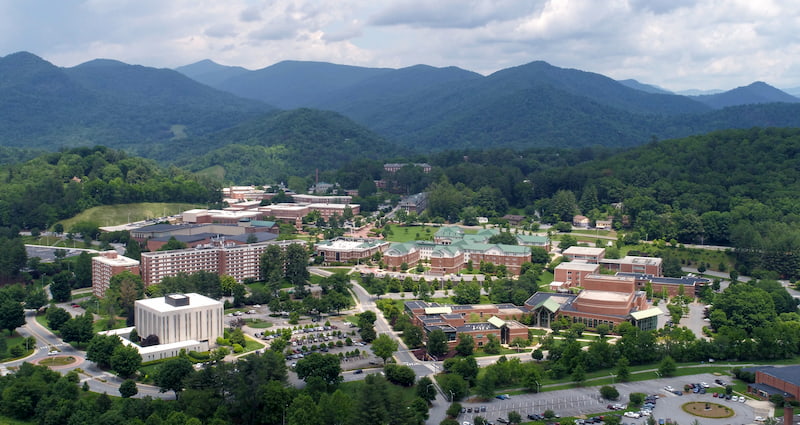SUSTAINED AND SUPERB ACHIEVEMENT
David L. Westling recalls a conversation from back during his days as a college student in Florida. It was the late 1960s, and Westling, a junior from Pensacola studying to become an English teacher, was talking to a fellow student who was majoring in special education and looking toward a career working with children with special needs. Westling was impressed that anyone would take on that kind of job and still recalls his words to the other student: “Wow, that’s amazing. I don’t know how anybody can do that. I’ll teach English. You’re special.”
But, about three years later, Westling found himself teaching special education in a small rural school in Reddick, Florida, although at that time he had no particular training in working with students with special needs. So, he went back to college and earned master’s and doctoral degrees in special education, and then he launched a career that now has spanned more than four decades of teaching, research, writing and mentoring. Revered by his colleagues on the Western Carolina University campus and known for his soft-spoken and unassuming manner, Westling is a nationally and internationally recognized leader in the field of special and inclusive education and, when he retires this coming June, will wrap up nearly 22 years as WCU’s Adelaide Worth Daniels Distinguished Professor of Special Education. A highlight of his tenure at WCU has been developing and leading, along with colleague Kelly Kelley ’03 MAEd ’06, the University Participant Program, an initiative that brings college-age adults with intellectual disabilities to campus for a two-year living and learning experience that helps them transition from secondary school to adult life through education, employment and independent living. That program, which started in the fall of 2007, has become a model across North Carolina and around the world.
In recognition of his long career of achievement, Westling was honored in November 2018 as a recipient of one of the University of North Carolina System’s top awards – the Gov. James E. Holhouser Jr. Award for Excellence in Public Service. During the award presentation at a meeting of the UNC Board of Governors in Chapel Hill, board Chair Harry L. Smith Jr. congratulated Westling, saying the system “is fortunate to have you as a distinguished member of its faculty. You’ve demonstrated sustained and superb achievement in university public service and in contributing to the quality of life of the citizens of North Carolina and beyond.” Then, when it was his time to speak, Westling thanked UNC officials, WCU’s administration and his colleagues in the university’s College of Education and Allied Professions and related to all those present in the jam-packed boardroom a philosophy that has guided his actions for the past four decades. “In the final analysis, it’s all about people,” he said. “I really feel that what we should do, if we’re doing anything at all, is that we should help people achieve their maximum potential, because that is what’s really important. If people are able to do that, I think the world is really a much better place, and that’s what I’ve tried to do over the years.”

In addition to his work developing support services for people with intellectual disabilities, David Westling teaches in WCU’s special education program.
Reflecting on his boyhood, Westling says the idea of achieving maximum potential was highly emphasized in the household in which he was raised. His parents were both U.S. Army veterans of World War II, and after the war they settled in Pensacola and started raising a family of academic achievers, with their five children accumulating a total of 13 college degrees over the years. When Westling arrived at the University of Florida in 1967, he discovered that he liked literature and picked English education as his major. He graduated with his bachelor’s degree in 1971 and was set to begin a career teaching boys and girls in Florida, except for one problem. “I couldn’t find a job as an English teacher,” he said. “I think there was one job posted in the state of Florida for teaching English, but lots of jobs in special education, so I took a job in special education. I thought it was really interesting, but it was hard work. Then an administrator in the school district where I worked told me, ‘You’re going to have to go back to school and learn something if you’re going to do this.’” So, Westling enrolled in the master’s degree program in special education at Florida, and upon successfully completing that, continued on in that university’s doctoral program.
After receiving his doctorate at Florida in 1976, Westling taught briefly at Florida Atlantic University before moving to Florida State University, where he taught in the special education department until August 1997, when he relocated to WCU to accept the first distinguished professorship in the university’s history. His teaching responsibilities at WCU have ranged from master’s-level courses to the introductory special education course for undergraduates. Also at WCU, he has received more than $8 million in state and federal grant funding for projects that include a support program to help special education teachers in Western North Carolina avoid rapid career burnout and an effort to address a shortage of educators and school support staff who are qualified to work with students with moderate to severe disabilities. Over the years, he has written three books that have helped guide the field of special and inclusive education and he has served as president of TASH, an international advocacy organization that supports individuals with disabilities and their families.
Nine years after Westling arrived at WCU, he was teaching a course in “Programs and Services for People with Intellectual Disabilities” for students in WCU’s master’s program in special education. Kelley, who earned her bachelor’s in special education at WCU, was among those students. “One day, we were talking about what happens to people with intellectual disabilities after high school and what’s available to them in their communities,” Kelley said. “I raised my hand and said, ‘OK, we’re talking about inclusion, but we’re not doing it here at WCU.’” Seizing the opportunity, Westling gave the students an assignment of coming up with a proposal of what such a program would look like, and the idea for the University Participant Program was born. The pilot program began with one male student on campus in the fall semester of 2007.
A handful of programs that brought students with intellectual disabilities to college campuses existed at that time, but they often resembled “miniature versions of high school special ed,” Westling said. “They would bring people to the campus but keep them kind of isolated, so we weren’t seeing many full-inclusion programs and not hardly any where these students actually lived in the residence halls.” In the meantime, Kelley had earned her master’s at WCU and had enrolled in the doctoral program in special education at UNC Charlotte, and she brought back information gleaned from other programs that was used to guide the WCU initiative, Westling said.

David Westling (center) receives the Holshouser Award from then-UNC System President Margaret Spellings and Harry Smith, chair of the UNC Board of Governors.
Now, 11 years later, a total of eight students are enrolled in the UP Program during fall and spring semesters. Four new students begin the two-year program each fall while four complete the program every spring. Also each semester, about 200 WCU undergraduate students volunteer to serve as peer support for UP students, providing an opportunity for them to gain insight into the obstacles and opportunities faced by young people with disabilities. Westling said he credits WCU administrators with being fully on board with the program from the beginning and the university community as a whole for embracing it. “We not only started the program, we had students with intellectual disabilities living in residence halls, going to classes, eating in the dining hall, joining fraternities. It moved this campus tremendously, and I think it moved society,” he said. The UP Program has now been replicated on many college campuses across the state, nation and world.
To date, a total of 27 students have completed the UP Program and have returned to their hometowns or have chosen to remain in the Cullowhee area. Across the nation, an average of 19 percent of young people with intellectual disabilities obtain competitive employment, but more than 90 percent of UP Program students accomplish that, said Kelley, now a WCU associate professor of inclusive and special education. Among the many cheerleaders for the program are the participating students’ parents. Rebecca “Becky” Garland ’86 MPA ’16 of Andrews, whose son David finished the program in May 2013, said she was impressed by its “person-centered planning” that focuses on the student’s long-term well-being. Her son, who has had a personal goal of working with an emergency medical services department, is now the staff custodian and part-time paramedic helper at a local EMS base, and friends on the staff there that have become like a second family. “It’s made all the difference in David’s life,” Garland said. “He has self-determination. He knows exactly what he wants, and he knows how to go out and get it. We owe the UP Program and its dedicated staff a debt of gratitude that we will never be able to repay.”
Westling said he has learned over the course of his career that underestimating the potential of individuals – including those with disabilities and those without them – is a mistake. “With the right kind of education and community support, those who have an intellectual disability can achieve much more than many assume,” he said. “And, with the right opportunity, many young adults are eager to step up and show how much they care about others.” Westling said he can look back on a career that’s been rewarding in many ways. “It’s hard to explain how good my life and career here at WCU have been,” he said.“I appreciate the (Holshouser) award, but truly, the work here has been its own reward.”

